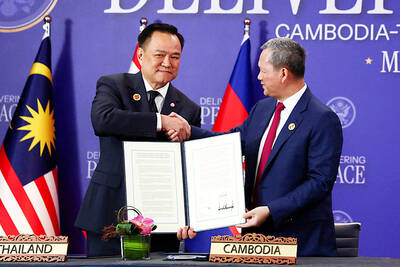South Sudanese rebels said they had taken control of the capital of oil-producing Upper Nile state yesterday, in the first fighting in a major town since rebels and the government signed a ceasefire last month.
The Juba government confirmed an assault was launched but denied rebels controlled the town, which lies 650km north of the national capital, Juba. It is also located on the fringes of one country’s main oil-producing areas.
The clashes will fuel concerns over the security of South Sudan’s northern oil fields — an economic lifeline for the world’s newest state — and raise pressure on both camps to revive stalled peace talks in Ethiopia.
Gathoth Gatkuoth, commander for rebel forces in Upper Nile who is a close ally of former South Sudanese vice president Riek Machar, said by telephone that his forces struck Malakal yesterday morning and swiftly retook the dusty market town.
“The rebels have violated the ceasefire and attacked Malakal this morning,” said Philip Aguer, spokesman for the government army, denying the town had fallen.
Aguer said that fighting continued in Malakal’s southern area although he said communication had been lost.
Aguer’s comments came after a spokesman for Upper Nile’s regional administration said clashes began about 7am and that the army was engaged in battles in Malakal’s northern, southern and central zones.
A Reuters photographer, who had been travelling with rebels this month, said the forces had been moving toward Malakal.
The rebel assault on the town may be aimed at strengthening its hand before a second round of peace talks begin.
Situated on the banks of the White Nile, Malakal first fell to rebels after fighting broke out in the middle of December last year before government forces recaptured it last month.
South Sudanese President Salva Kiir’s government and rebels who support Machar have both accused the other of violating the Jan. 23 ceasefire deal brokered by east African states.
Thousands of people have been killed and more than 800,000 have fled their homes since fighting was triggered by a power struggle between Kiir and Machar, whom Kiir sacked in July last year.
UN spokesman in South Sudan Joe Contreras said a UN camp in Malakal, where many of the displaced people had fled for protection, had been caught in the crossfire.
South Sudan says it has been forced to cut oil production by a fifth to 200,000 barrels per day, all of which is pumped from Upper Nile. Oil accounts for 98 percent of government revenues.
Malakal lies about 140km from Paloch, an oil complex where a key crude oil processing facility is situated.
“All the oil from the fields around Upper Nile is pumped to Paloch,” said Jacob Jok Dut, director of the Centre for Democracy and International Analysis, who follows the oil industry closely. “If Malakal comes under rebel control, then definitely there will be tension in and around Upper Nile.”
Peace talks had been due to resume last week, but were held up by a rebel demand that four remaining political prisoners held by the government be released and the Ugandan military, which is supporting Kiir’s Sudan People’s Liberation Army, withdraw from South Sudan.
The government says the detainees tried to launch a coup.

Shamans in Peru on Monday gathered for an annual New Year’s ritual where they made predictions for the year to come, including illness for US President Donald Trump and the downfall of Venezuelan President Nicolas Maduro. “The United States should prepare itself because Donald Trump will fall seriously ill,” Juan de Dios Garcia proclaimed as he gathered with other shamans on a beach in southern Lima, dressed in traditional Andean ponchos and headdresses, and sprinkling flowers on the sand. The shamans carried large posters of world leaders, over which they crossed swords and burned incense, some of which they stomped on. In this

‘NO COUNTRY BUMPKIN’: The judge rejected arguments that former prime minister Najib Razak was an unwitting victim, saying Najib took steps to protect his position Imprisoned former Malaysian prime minister Najib Razak was yesterday convicted, following a corruption trial tied to multibillion-dollar looting of the 1Malaysia Development Berhad (1MDB) state investment fund. The nation’s high court found Najib, 72, guilty on four counts of abuse of power and 21 charges of money laundering related to more than US$700 million channeled into his personal bank accounts from the 1MDB fund. Najib denied any wrongdoing, and maintained the funds were a political donation from Saudi Arabia and that he had been misled by rogue financiers led by businessman Low Taek Jho. Low, thought to be the scandal’s mastermind, remains

Near the entrance to the Panama Canal, a monument to China’s contributions to the interoceanic waterway was torn down on Saturday night by order of local authorities. The move comes as US President Donald Trump has made threats in the past few months to retake control of the canal, claiming Beijing has too much influence in its operations. In a surprising move that has been criticized by leaders in Panama and China, the mayor’s office of the locality of Arraijan ordered the demolition of the monument built in 2004 to symbolize friendship between the countries. The mayor’s office said in

FIGHTING CONTINUES: Thai military dropped 40 bombs on border areas, Cambodia said, while Bangkok said Phnom Penh launched heavy attacks and damaged homes Cambodia yesterday accused Thailand of intensifying its bombardment of disputed border areas, even as officials from the two countries attend a multi-day meeting aimed at negotiating an end to deadly clashes. The neighbors’ long-standing border conflict reignited this month, shattering an earlier truce and killing more than 40 people, according to official counts. About 1 million people have also been displaced. Cambodian and Thai officials were in their third day of talks at a border checkpoint, with ministers of defense from the two countries scheduled to meet today. However, the Cambodian Ministry of National Defense said Thailand’s military carried out a heavy